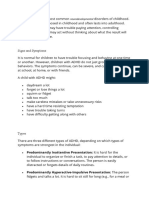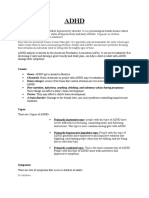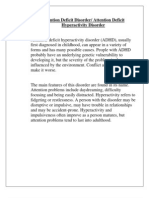Attention DeficitHyperactivity Disorder (ADHD) A Complex Neurodevelopmental Condition
Attention DeficitHyperactivity Disorder (ADHD) A Complex Neurodevelopmental Condition
Uploaded by
91akshayraj2004Copyright:
Available Formats
Attention DeficitHyperactivity Disorder (ADHD) A Complex Neurodevelopmental Condition
Attention DeficitHyperactivity Disorder (ADHD) A Complex Neurodevelopmental Condition
Uploaded by
91akshayraj2004Copyright
Available Formats
Share this document
Did you find this document useful?
Is this content inappropriate?
Copyright:
Available Formats
Attention DeficitHyperactivity Disorder (ADHD) A Complex Neurodevelopmental Condition
Attention DeficitHyperactivity Disorder (ADHD) A Complex Neurodevelopmental Condition
Uploaded by
91akshayraj2004Copyright:
Available Formats
Attention Deficit/Hyperactivity Disorder (ADHD): A Complex
Neurodevelopmental Condition
Attention Deficit/Hyperactivity Disorder (ADHD) is a common neurodevelopmental disorder
that primarily affects children and adolescents. It's characterized by a persistent pattern of
inattention, hyperactivity, and impulsivity. These symptoms can significantly impact a
person's daily life, including their academic performance, social interactions, and overall
well-being.
The exact prevalence of ADHD varies, but it's estimated to affect between 5% and 11% of
children and adolescents worldwide. While symptoms often emerge in childhood, they can
persist into adulthood for many individuals.
Key Symptoms of ADHD:
Inattention: Difficulty focusing, easily distracted, forgetful, and disorganized.
Hyperactivity: Excessive energy, restlessness, and difficulty sitting still.
Impulsivity: Acting without thinking, difficulty waiting, and interrupting others.
Comorbidities and Consequences:
ADHD frequently co-occurs with other mental health conditions, such as:
Anxiety disorders
Depression
Conduct disorder
Learning disabilities
Substance abuse disorders
Untreated ADHD can lead to a range of negative consequences, including:
Academic difficulties
Social problems
Behavioral issues
Increased risk of accidents and injuries
Difficulty maintaining relationships
Challenges in the workplace
Neurobiological Basis:
Research suggests that ADHD has a strong genetic component and is associated with
alterations in brain structure and function. Neurotransmitter imbalances, particularly
involving dopamine and norepinephrine, are believed to play a role in the development of
ADHD symptoms.
Diagnosis and Treatment:
Diagnosis of ADHD typically involves a comprehensive evaluation by a healthcare
professional, including a review of symptoms, medical history, and psychological testing.
Treatment for ADHD often combines medication and behavioral therapy. Stimulant
medications are commonly prescribed to help improve attention and reduce hyperactivity.
Behavioral therapies, such as parent training and cognitive-behavioral therapy, can teach
strategies for managing symptoms and improving coping skills.
Early diagnosis and effective treatment are crucial for individuals with ADHD. With
appropriate interventions, many individuals with ADHD can lead successful and fulfilling
lives.
You might also like
- Biology INVESTIGATORY PROJECT ON ADHDDocument14 pagesBiology INVESTIGATORY PROJECT ON ADHDVIGNESH50% (2)
- Oppositional Defiant DisorderDocument2 pagesOppositional Defiant DisorderNikhil MohanNo ratings yet
- Understanding ADHD - Symptoms, Causes, and ManagementDocument3 pagesUnderstanding ADHD - Symptoms, Causes, and ManagementMaks MNo ratings yet
- Clinical Case Analysis AdhdDocument5 pagesClinical Case Analysis AdhdSiobhan GreeneNo ratings yet
- AdhdDocument18 pagesAdhdnrwv4rfkstNo ratings yet
- ADHDDocument2 pagesADHDMuhammad ShoaibNo ratings yet
- ADHD - Investigatory Project - 12C DraftDocument6 pagesADHD - Investigatory Project - 12C DraftFaima A.100% (1)
- Exploring ADHDDocument5 pagesExploring ADHDzinneerah.4187No ratings yet
- "Unleashing the Power of Hyperactivity: How to Channel Your Child's Energy and Unlock Their Full Potential"From Everand"Unleashing the Power of Hyperactivity: How to Channel Your Child's Energy and Unlock Their Full Potential"No ratings yet
- ADHD for adults: Management, causes and treatments of ADHD in adulthood | A guidebook for those affected and interested | With self-testing and everyday tipsFrom EverandADHD for adults: Management, causes and treatments of ADHD in adulthood | A guidebook for those affected and interested | With self-testing and everyday tipsNo ratings yet
- ADHDDocument2 pagesADHDMerijn MattheijssenNo ratings yet
- What Are The Different Types of ADHD?Document6 pagesWhat Are The Different Types of ADHD?Edgar GilNo ratings yet
- Feminism in IndiaDocument2 pagesFeminism in IndiaonlyforpahedownloadsNo ratings yet
- Nursing Management TrueDocument46 pagesNursing Management TrueTriplet 727 Triplet 727No ratings yet
- ADHD Rehab MedikDocument10 pagesADHD Rehab MedikDavid PattersonNo ratings yet
- AdhdDocument7 pagesAdhdmznsniped2008No ratings yet
- AdhdDocument21 pagesAdhdkhingxxdreNo ratings yet
- Clinical Assessment and Treatment of Attention Deficit Hyperactivity Disorder in AdultsDocument15 pagesClinical Assessment and Treatment of Attention Deficit Hyperactivity Disorder in Adults733No ratings yet
- ADHD: Understanding Symptoms, Treatments, and Self-Help StrategiesFrom EverandADHD: Understanding Symptoms, Treatments, and Self-Help StrategiesNo ratings yet
- Misdiagnosis and Misuse of Medication in AdhdDocument5 pagesMisdiagnosis and Misuse of Medication in AdhdAyub MaingiNo ratings yet
- Adhd OrgDocument74 pagesAdhd OrgNeil Marzon PaguicanNo ratings yet
- Attention Deficit Hyperactivity DisorderDocument3 pagesAttention Deficit Hyperactivity DisorderAlisa Pacurar100% (1)
- What Is The Evidence Base To Support The Use of Medicines in The Treatment of ADHD Children and Young People (3) 4Document7 pagesWhat Is The Evidence Base To Support The Use of Medicines in The Treatment of ADHD Children and Young People (3) 4Syeda Aliza shahNo ratings yet
- Adhd ArticleDocument6 pagesAdhd Articleapi-115513756No ratings yet
- Attention Deficit Activity Disorder 2Document8 pagesAttention Deficit Activity Disorder 2shashikala meedeniyaNo ratings yet
- CADDRA ADHD Information Resources HandoutDocument2 pagesCADDRA ADHD Information Resources HandoutMustafa AlmasoudiNo ratings yet
- Attention Deficit Hyperactivity Disorder - StatPearls - NCBI BookshelfDocument7 pagesAttention Deficit Hyperactivity Disorder - StatPearls - NCBI BookshelfAgnes Zenyka WongsoNo ratings yet
- The University of The West Indies Cave Hill Campus: TO Dr. George MahyDocument6 pagesThe University of The West Indies Cave Hill Campus: TO Dr. George MahyKala ArchieNo ratings yet
- Lai 574 Ohi-Adhd BrochureDocument3 pagesLai 574 Ohi-Adhd Brochureapi-259258566No ratings yet
- ADHD (Attention DeficitDocument7 pagesADHD (Attention Deficitgudiyabegum405No ratings yet
- 49Document2 pages49yersaiyn.kairzhanovNo ratings yet
- Developmental Psychopathology CP-2 - 223377 (Himanshi Lahora) MA Psychology Sem 4Document9 pagesDevelopmental Psychopathology CP-2 - 223377 (Himanshi Lahora) MA Psychology Sem 4Himanshi LahoraNo ratings yet
- Case Study On Adhd FinalDocument33 pagesCase Study On Adhd FinalafrnbrahNo ratings yet
- Facts For Parents - ADHDDocument6 pagesFacts For Parents - ADHDSugnyani DeviNo ratings yet
- Causes and Risk Factors For Attention-Deficit Hyperactivity DisorderDocument8 pagesCauses and Risk Factors For Attention-Deficit Hyperactivity DisorderFranthesa LayloNo ratings yet
- ADHDDocument4 pagesADHDAlina Alexandru100% (1)
- Gut microbiome in ADHD and nutraceuticals' efficacyDocument7 pagesGut microbiome in ADHD and nutraceuticals' efficacyagelikiNo ratings yet
- ADD vs. ADHDDocument13 pagesADD vs. ADHDKathleen Josol100% (1)
- AdhdDocument4 pagesAdhdSabrina Alam MrittikaNo ratings yet
- Attention Deficit Hyperactivity Disorder: ClassificationDocument14 pagesAttention Deficit Hyperactivity Disorder: ClassificationBharat RasghaniaNo ratings yet
- Understanding Child DevelopmentDocument11 pagesUnderstanding Child DevelopmentcathyNo ratings yet
- Attention Deficit-Hyperactive DisorderDocument3 pagesAttention Deficit-Hyperactive Disorderadan oladiveNo ratings yet
- Adult ADHD: Understanding Symptoms, Treatments, and Self-Help StrategiesFrom EverandAdult ADHD: Understanding Symptoms, Treatments, and Self-Help StrategiesNo ratings yet
- Attention Deficit Hyperactivity DisorderDocument8 pagesAttention Deficit Hyperactivity DisorderShinjiNo ratings yet
- ADHD Patient Information Version 3Document4 pagesADHD Patient Information Version 3Erika Johanna SeguraNo ratings yet
- Adhd - Zainab HyderabadwalaDocument5 pagesAdhd - Zainab HyderabadwalazainabNo ratings yet
- Children With HyperactiveDocument7 pagesChildren With HyperactivejoannadavNo ratings yet
- ADHD Symptoms, Causes & TreatmentDocument1 pageADHD Symptoms, Causes & Treatmentcol.2021010511No ratings yet
- Detachment - What Is AdhdDocument3 pagesDetachment - What Is AdhdFlor AmarilloNo ratings yet
- Attention Deficit Disorder/ Attention Deficit Hyperactivity DisorderDocument23 pagesAttention Deficit Disorder/ Attention Deficit Hyperactivity DisorderLisa Nelson-FriginetteNo ratings yet
- Adhd Information 1Document10 pagesAdhd Information 1jamesjenkinspianistNo ratings yet
- AdhdDocument19 pagesAdhdKim Cathleen ArceraNo ratings yet
- Attention Deficit Hyperactivity DisorderDocument5 pagesAttention Deficit Hyperactivity DisorderPugsley AddamsNo ratings yet
- AttentionDocument6 pagesAttentionSneha BhattNo ratings yet
- ADHD In Adults: Am I ADHD? Interactive Questions For ADHD Assessment: Learn If You Suffer From ADHD - Take This Assessment TestFrom EverandADHD In Adults: Am I ADHD? Interactive Questions For ADHD Assessment: Learn If You Suffer From ADHD - Take This Assessment TestNo ratings yet
- Nero Developmental Disorder NotesDocument16 pagesNero Developmental Disorder Notesemotionocean101No ratings yet
- Attention-Deficit/Hyperactivity DisorderDocument3 pagesAttention-Deficit/Hyperactivity DisorderAkhwand SaulatNo ratings yet
- ADHDDocument8 pagesADHDolaniyiolabanjo5No ratings yet



























































